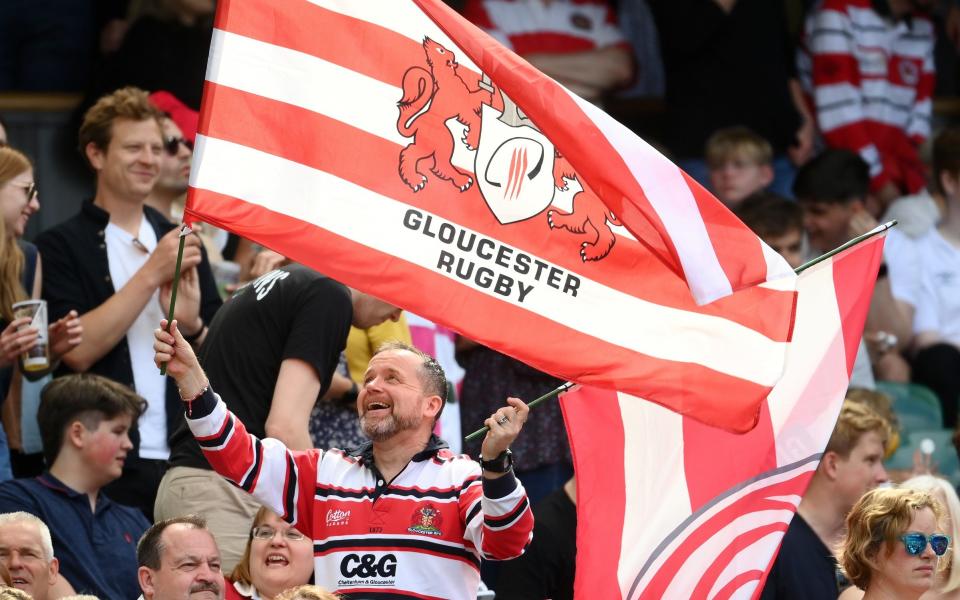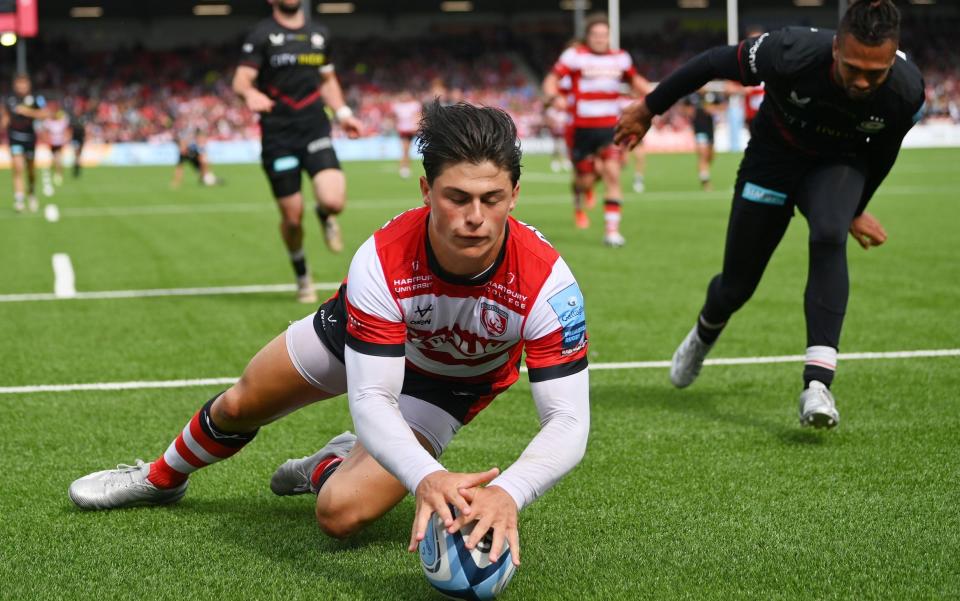Alex Brown: Gloucester have not reached the highs they deserve – I’m going to try to change that

Alex Brown describes attempting to tackle Soane Tonga’uiha on the opening day of the 2012-13 Premiership season as “a mistake”. In trying to stop Northampton’s cult hero, a rumbunctious prop who made a habit of bumping away defenders, he severed a nerve in his shoulder.
A debilitating injury would end the lock’s playing days, which had featured 235 appearances for Gloucester up to that point. But Brown might have been feeling thankful for that collision this week, because it inadvertently nudged him towards onto a different career path. And a further decade at Kingsholm – in various positions from line-out strategist to chief commercial officer via team manager, supplementing 10 seasons in the second row – has eventually led to the chief executive role.
On the back of a dire 12 months in which three top-flight clubs went bust, it helps to have an optimistic outlook if you are aiming to fix English rugby union. Fortunately, then, Brown seems composed and positive about taking over from Lance Bradley, who resigned this summer. The respective fates of Worcester Warriors, Wasps and London Irish saddened Brown, and he hopes there will be a route back for each in time. For now, though, a 10-team Premiership feels exciting.
“My view is that the Premiership as a league is in fantastic shape,” Brown insists. “What a competitive league. Last season was so compelling with so much jeopardy on every game, and not knowing who was going to win. That was not the case back when I was playing. It was very, very different. I think every team is fighting for that inch, which makes it a cracking league to be in.”
Gloucester supporters need little reminder of that jeopardy. A promising start to the 2022-23 campaign crumbled with an injury crisis and their side ended up in 10th, with only Newcastle Falcons below them. Brown bemoans “very small margins”, yet confesses that Gloucester “let ourselves down”. With Zach Mercer arriving ahead of next season, there is a hope of a revival. More than most, Brown is wary that “sleeping giant” rhetoric could grate on those that have heard it all before.

“There’s no denying that Gloucester Rugby has not been where we should be,” Brown says. “I’ve been at the club for a long time and I’ve been through it all – losing in finals, not quite making them. Can I put my finger on why? It’s a multitude of things. But one thing for sure is that consistency will help that.”
In that respect, Brown suggests that the needs of his club and those of the Premiership as a whole are similar. Both require stability following choppy periods. First, Gloucester. Brown will prioritise improving the fan experience, with a “data strategy piece” to better understand how to serve supporters. He praises Martin St Quinton, “a wonderful chairman”, and pinpoints local fans as another constant. Added to that, owning Kingsholm makes Gloucester “particularly lucky” and gives them a relatively firm foothold.
“Overall, our financial situation is what it is in rugby: challenging,” Brown explains. “But there are so many opportunities and we are blessed to have a special community behind us. Our season-ticket holders are stoic, and so proud of the club. They love it, and that’s why we do it.”
There is clearly a desire to give George Skivington time to settle, which has not always appeared to be the case with Gloucester coaches. Indeed, the rugby side of the business has burned through a plethora of figureheads since Brown joined in 2003. That said, many have aided him. When the fateful shoulder injury occurred, Nigel Davies absorbed him into the backroom staff. Years later, David Humphreys would encourage Brown to undertake a business MBA.
Concerning the Premiership more generally, there is an urge for patience and persistence rather than change. As a new, crucial professional game agreement (PGA) is finalised, Brown has been impressed by Simon Massie-Taylor, the league’s chief executive.
“He’s got a fresh, aligned approach and is working with the clubs to drive it forward,” Brown says of Massie-Taylor. “As a group, we couldn’t be closer. Over the last two or three years, the clubs have come to the understanding that, on the field, we are definitely rivals with a competitive edge, but off the field, we should collaborate to grow the game.
“I think we absolutely can, and Simon is driving that. We’re down to 10 teams now and that feels right. We have the breaks when we need them and players aren’t too stressed by over-playing. There are so many positives to it. And hopefully the end result will be that we have an amazing Premiership, we are competitive in Europe and we have a national team that is flying.”

Brown fields potentially tricky issues with a calm demeanour. Does the reduction of teams in the Premiership put more pressure on a better broadcast deal to off-set losses in match-day revenue?
“I think it actually makes it a little bit simpler,” he replies. “There was always a challenge, when international games were going on, of which games are supported. There is a conflict there and this clears it up nicely. It is a clean product and less is more, actually. Doing less and raising the quality, I think, is better.”
What about the much-debated salary cap? Should it stay at its current level or be hiked, provided clubs can be trusted not to over-reach? Brown is assured that work is afoot.
“I think what needs to happen is that the level of the salary cap is determined by the central income,” he says. “That is not going to happen overnight because the nature of players’ contracts is that they span over two, three and four years. Clubs, us included, are committed to maxing that and doing as well as we can.
“That’s why the competition is fantastic, but, to make it sustainable, we need to be far more aligned to that central income. That’s the route we’re going and I don’t see it being too much of a problem. Behind the scenes, that is changing, for sure.”
Having experienced relegation as a player with Bristol, and being a big admirer of Rob Baxter’s efforts at Exeter Chiefs, Brown is on board with the “aspirational opportunity” that promotion affords. He would consider reintroducing relegation in future, once “solid foundations” have been restored.
Returning to the focus of his day-to-day, Brown’s aim to win at everything – on the pitch, with sponsorship deals, by building the Gloucester brand or even delivering community events – should hearten those of a Cherry and White persuasion. And his time in the West Country gives him a sharp appreciation of what that means.
“I’m very humbled and honoured to do this role and I know it comes with a huge amount of responsibility,” he finishes. “I know that responsibility, because I know the importance that Gloucester, and Gloucester succeeding, has to this community. Ultimately, that’s why we are here, for the rugby to be the best it can be. I’m under no illusion; we haven’t reached the highs that we should have done.”

 Yahoo Sport
Yahoo Sport 





































